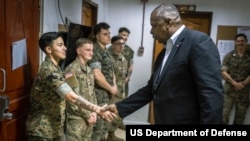Senior U.S. defense officials are expressing optimism that a high-level visit to the Philippines will pay off, possibly with an agreement for expanded military cooperation and greater access to Philippine military bases.
U.S. Defense Secretary Lloyd Austin, who arrived in Manila late Tuesday sounded upbeat ahead of critical meetings Thursday with Philippine Defense Minister Carlito Galvez, Jr. and National Security Adviser Eduardo Ano, as well as with Philippine President Ferdinand Marcos, Jr.
“I think it’s going to be a good day,” Austin said Wednesday, during a visit to Camp Navarro, home to the Philippine military’s West Mindanao Command as well as to some 150 U.S. troops, including special operation forces, who have been advising the Philippines on counterterrorism efforts and training.
“I look forward to not only meeting them tomorrow but establishing a long and productive relationship,” Austin added.
Austin’s visit to the Philippines comes as the United States is increasingly focused on finding ways to help countries across the Indo-Pacific push back against increasingly aggressive Chinese behavior.
It also follows what senior U.S. defense officials have described as a “pretty busy pace” of high-level talks, including discussions late last month in Manila that involved about 200 U.S. and Philippines officials.
Those talks, as well as overtures by Marcos since taking office this past June, have helped mend ties between the long-time allies, strained after former President Rodrigo Duterte threatened to terminate the security agreement that allowed U.S. forces to remain in the Philippines.
“We’re very encouraged by the progress we’ve seen in the alliance and by what we see is really positive momentum under the Marcos administration thus far,” a senior U.S. defense official told reporters Wednesday, following Austin’s visit to Camp Navarro.
“A stronger alliance is important because it not only brings peace and stability, but it deters further crises or provocations in the region,” the official added, speaking on the condition of anonymity in order to discuss the ongoing deliberations.
Senior Philippine officials are likewise striking an optimistic tone about an expanded U.S. military presence.
“We are going to have definitely an announcement of some sort,” a senior Philippines official told Reuters, noting Washington is pushing for access to as many as four or five more military sites under the auspices of the Enhanced Defense Cooperation Agreement, signed back in 2014.
“I just don’t know how many would be the final outcome,” the Philippines official said, requesting anonymity due to the sensitive nature of the talks.
Both U.S. and Philippines officials, though, pointed to the ongoing cooperation in Zamboanga, in the southern Philippines, as an example of how working together has benefited both countries.
“The kind of work that you’ve been doing down here for a very long time is absolutely extraordinary. It makes your country more secure. It makes ours more secure,” Austin told Philippine Chief of Defense, General Andres Centino.
“The work between our special operations forces is really central to our relationship, our alliance,” Austin said. “I truly hope we can continue to build upon the kinds of things you guys have established down here.”
Centino, likewise, called the contribution of U.S. troops, to both his force’s counterterrorism operations, with resources like Gray Eagle drones, and to search and rescue missions, invaluable.
“We cannot thank you enough,” Centino told Austin. “They’ve been doing very good job in supporting our operations.”
Senior U.S. defense officials said Wednesday the hope is that some of the experience both countries have gained in countering terror groups, like Abu Sayyaf and Islamic State, can carry over into a broader mission aimed at helping the Philippines protect its territorial integrity from encroachment by China.
“What we’re doing with the Philippines is working with them so that together as an alliance we can help ensure … they have the capability to defend their own sovereignty and prevent the kind of coercion that they’re facing on a day-to-day basis,” said a second senior U.S. defense official.
“What the Philippines is trying to do is uphold its rights and we’re trying to help them do that in the same way we are with other partners around the region,” the official added.

